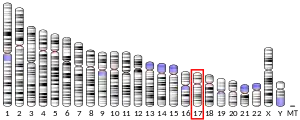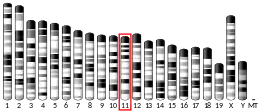TMC8
Transmembrane channel-like 8 is a protein which in humans is encoded by the TMC8 gene.[5][6]
| TMC8 | |||||||||||||||||||||||||||||||||||||||||||||||||||
|---|---|---|---|---|---|---|---|---|---|---|---|---|---|---|---|---|---|---|---|---|---|---|---|---|---|---|---|---|---|---|---|---|---|---|---|---|---|---|---|---|---|---|---|---|---|---|---|---|---|---|---|
| Identifiers | |||||||||||||||||||||||||||||||||||||||||||||||||||
| Aliases | TMC8, EV2, EVER2, EVIN2, transmembrane channel like 8 | ||||||||||||||||||||||||||||||||||||||||||||||||||
| External IDs | OMIM: 605829 MGI: 2669037 HomoloGene: 45126 GeneCards: TMC8 | ||||||||||||||||||||||||||||||||||||||||||||||||||
| |||||||||||||||||||||||||||||||||||||||||||||||||||
| |||||||||||||||||||||||||||||||||||||||||||||||||||
| |||||||||||||||||||||||||||||||||||||||||||||||||||
| |||||||||||||||||||||||||||||||||||||||||||||||||||
| |||||||||||||||||||||||||||||||||||||||||||||||||||
| Wikidata | |||||||||||||||||||||||||||||||||||||||||||||||||||
| |||||||||||||||||||||||||||||||||||||||||||||||||||
Function
The protein encoded by this gene is an integral membrane protein that localize to the endoplasmic reticulum and is predicted to form transmembrane channels. This gene encodes a transmembrane channel-like protein with 8 predicted transmembrane domains and 3 leucine zipper motifs.[6]
Clinical significance
Mutations in the TMC8 gene are associated with epidermodysplasia verruciformis (EV), an autosomal recessive dermatosis characterized by abnormal susceptibility to human papillomaviruses (HPVs) and a high rate of progression to squamous cell carcinoma on sun-exposed skin.[6]
References
- GRCh38: Ensembl release 89: ENSG00000167895 - Ensembl, May 2017
- GRCm38: Ensembl release 89: ENSMUSG00000050106 - Ensembl, May 2017
- "Human PubMed Reference:". National Center for Biotechnology Information, U.S. National Library of Medicine.
- "Mouse PubMed Reference:". National Center for Biotechnology Information, U.S. National Library of Medicine.
- Ramoz N, Rueda LA, Bouadjar B, Montoya LS, Orth G, Favre M (December 2002). "Mutations in two adjacent novel genes are associated with epidermodysplasia verruciformis" (PDF). Nature Genetics. 32 (4): 579–81. doi:10.1038/ng1044. PMID 12426567. S2CID 20013445.
- "Entrez Gene: TMC8 transmembrane channel-like 8".
Further reading
- Olsen JV, Blagoev B, Gnad F, et al. (2006). "Global, in vivo, and site-specific phosphorylation dynamics in signaling networks". Cell. 127 (3): 635–48. doi:10.1016/j.cell.2006.09.026. PMID 17081983. S2CID 7827573.
- Ramoz N, Taïeb A, Rueda LA, et al. (2000). "Evidence for a nonallelic heterogeneity of epidermodysplasia verruciformis with two susceptibility loci mapped to chromosome regions 2p21-p24 and 17q25". J. Invest. Dermatol. 114 (6): 1148–53. doi:10.1046/j.1523-1747.2000.00996.x. PMID 10844558.
- Gerhard DS, Wagner L, Feingold EA, et al. (2004). "The status, quality, and expansion of the NIH full-length cDNA project: the Mammalian Gene Collection (MGC)". Genome Res. 14 (10B): 2121–7. doi:10.1101/gr.2596504. PMC 528928. PMID 15489334.
- Ota T, Suzuki Y, Nishikawa T, et al. (2004). "Complete sequencing and characterization of 21,243 full-length human cDNAs". Nat. Genet. 36 (1): 40–5. doi:10.1038/ng1285. PMID 14702039.
- Keresztes G, Mutai H, Heller S (2003). "TMC and EVER genes belong to a larger novel family, the TMC gene family encoding transmembrane proteins". BMC Genomics. 4 (1): 24. doi:10.1186/1471-2164-4-24. PMC 165604. PMID 12812529.
- Strausberg RL, Feingold EA, Grouse LH, et al. (2002). "Generation and initial analysis of more than 15,000 full-length human and mouse cDNA sequences". Proc. Natl. Acad. Sci. U.S.A. 99 (26): 16899–903. Bibcode:2002PNAS...9916899M. doi:10.1073/pnas.242603899. PMC 139241. PMID 12477932.
- Patel AS, Karagas MR, Pawlita M, et al. (2008). "Cutaneous human papillomavirus infection, the EVER2 gene and incidence of squamous cell carcinoma: a case-control study". Int. J. Cancer. 122 (10): 2377–9. doi:10.1002/ijc.23377. PMC 2705140. PMID 18224692.
- Zavattaro E, Azzimonti B, Mondini M, et al. (2008). "Identification of defective Fas function and variation of the perforin gene in an epidermodysplasia verruciformis patient lacking EVER1 and EVER2 mutations". J. Invest. Dermatol. 128 (3): 732–5. doi:10.1038/sj.jid.5701124. PMID 17960179.
- Lazarczyk M, Pons C, Mendoza JA, et al. (2008). "Regulation of cellular zinc balance as a potential mechanism of EVER-mediated protection against pathogenesis by cutaneous oncogenic human papillomaviruses". J. Exp. Med. 205 (1): 35–42. doi:10.1084/jem.20071311. PMC 2234378. PMID 18158319.
- Kurima K, Yang Y, Sorber K, Griffith AJ (2003). "Characterization of the transmembrane channel-like (TMC) gene family: functional clues from hearing loss and epidermodysplasia verruciformis". Genomics. 82 (3): 300–8. doi:10.1016/S0888-7543(03)00154-X. PMID 12906855.
- Rady PL, De Oliveira WR, He Q, et al. (2007). "Novel homozygous nonsense TMC8 mutation detected in patients with epidermodysplasia verruciformis from a Brazilian family". Br. J. Dermatol. 157 (4): 831–3. doi:10.1111/j.1365-2133.2007.08123.x. PMID 17711520. S2CID 34199539.
This article incorporates text from the United States National Library of Medicine, which is in the public domain.



